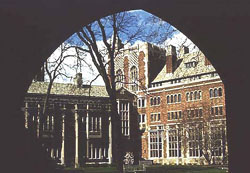Gallery of Philologists


George A Kennedy
17 May 1901 (Tangsyi) - 15 August 1960 (at sea)
Kennedy, the son of missionaries, was born on 17 May 1901 in Tangsyi, in the Wu dialect area of China. He was later to turn to good account this native acquaintance with what he called "Tangsic," a phonologically older form of Chinese than is preserved in standard Mandarin. He graduated from the Shanghai American School (1917) and from Wooster College (1922), the latter with honors in Greek and Latin. There followed periods of theological study and a first marriage (1925), alternating with stints of teaching in China, the last of them in the Shanghai Public School (1929-1932). He there became involved with a worthy social project: the reform of the Shanghai prostitutes. But for every girl placed in a good home, the buses from the country brought in a score of replacements. This ethical imbalance eventually led to a personal crisis.
Kennedy's reaction to the crisis was to begin over again. He left Shanghai for Berlin in 1932, divorced his wife in 1933, and remarried on 22 October 1934. He received in that year German government interpreter's diplomas in Chinese and Japanese, and held a Research Assistantship in the Library of Congress. He earned his PhD at Berlin under Erich Haenisch for a thesis on the early history of the Manchus, and began his academic career at Yale as a Lecturer in 1935. His first scholarly work, a seminal study of the Chun/Chyou, was published as Tchun-tchiu Kritik by Sinica (Sonderausgabe) in 1934.
WW2 greatly distorted Kennedy's life. He was involved with Yale's share of the crash program for teaching modern Chinese to military personnel. In his postwar years, he was also beset with illness: an untreated cancer which finally killed him in 1960.
His last article, on Shr 220 (in English), appeared in the Karlgren festschrift Studia Serica in 1959. His second career thus spanned a full quarter-century of exactly 25 years. During 1948/49, as a Fulbright Fellow in China, he taught, at Peking University, what Lwo Chang-pei characterized as the first lectures on early Chinese grammar ever given in China. This made a grammatical counterpart to Karlgren's introducing the Chinese to the historical phonology of their own language, via the translation of his Etudes in 1939.
In late years, to cope with the pain of advancing cancer, he turned increasingly to drink, which had been a recourse already in Shanghai days. His friend Peter Boodberg, who would visit from Berkeley, often found Kennedy drunk when they met at the New Haven airport. Kennedy accomplished nothing in a 1959/60 Guggenheim year in Japan, and died of a heart attack on 15 August 1960, during the voyage back.
Kennedy was one of many to lose a linguistic argument with the irascible Karlgren, the point at issue being tonal rhymes in the Shr. Kennedy's position, though technically superior, has so far made little headway among scholars. Much of his work is suggestive rather than final: his own rueful title for one study was "An Abortive Grammar of Mencius." But the nature of that failure shows where the correct postulates for a study of Chinese grammar may lie, and what the nature of Chinese word classes may be. Kennedy had thata extremely rare gift: a knack for finding the right point at which to attack a problem, and an unerring sense of how to puncture such popular fallacies as the Fenollosa ideographic delusion and the monosyllabic myth. His gift for teaching, and his sense of what can be done with even a little learning properly applied, shows in his book reviews and his "ZH Guide," a manual for the Tsz Hai dictionary which has inspired the compilation of many other handbooks.
His death caused a massive outflux of his students to the far corners of North America, and Yale from that moment ceased to exist as a focus of classical Sinology. Kennedy's work in establishing the Chinese library at Yale, of which he was Curator in 1947-1960, is not remembered. His tree has been cut down at Far Eastern Publications, which he founded, and which was recently absorbed into the Yale University Press. His writings, some gathered in Li T'ien-yi's Selected Works volume, remain to intrigue, and by their very incompleteness to inspire, later ages.
Readings
- George A Kennedy (ed). Wennti Papers
- George A Kennedy. ZH Guide
- George A Kennedy. Minimum Vocabularies of Written Chinese
- Li T'ien-yi (Ed). Selected Works of George A Kennedy. Far Eastern 1964
- George A Kennedy (a longer profile in the Sinology section of this site)
This is the last page of the Gallery of Philologists. It brings us more or less up to the point at which Chinese and Western philological traditions had productively merged, a point from which the path to the future will increasingly be single. If philology in the sense here meant has a future, gnetle readers, it is ourselves. We have been shown the way.

